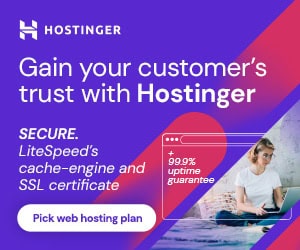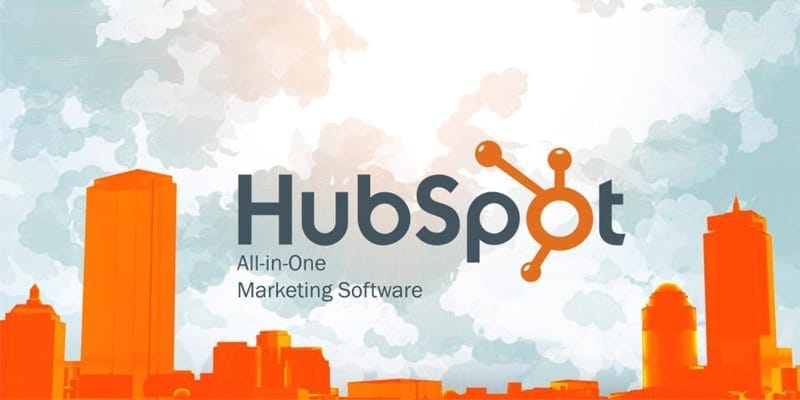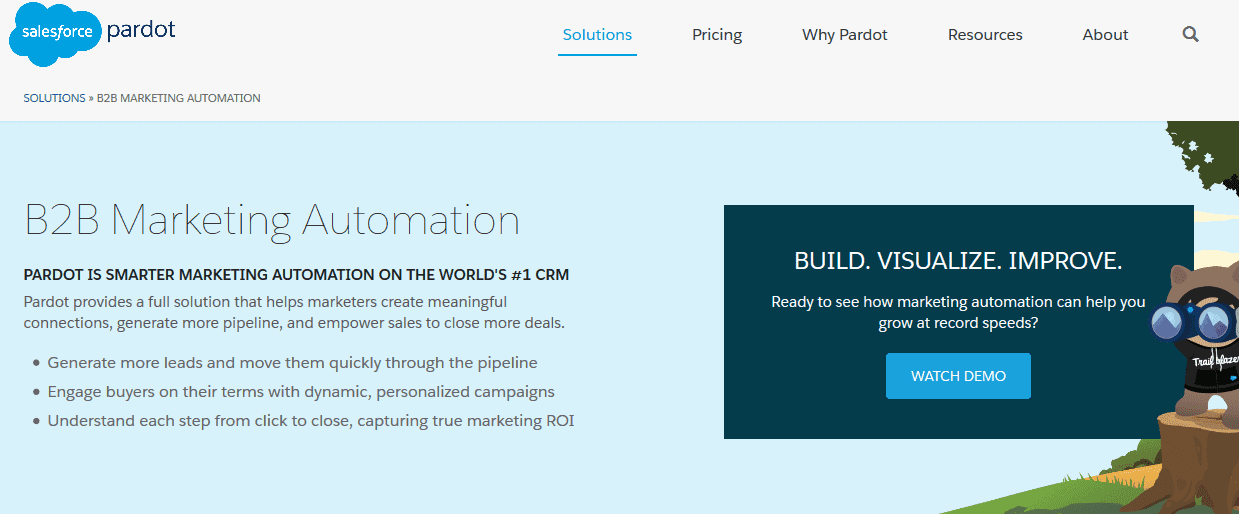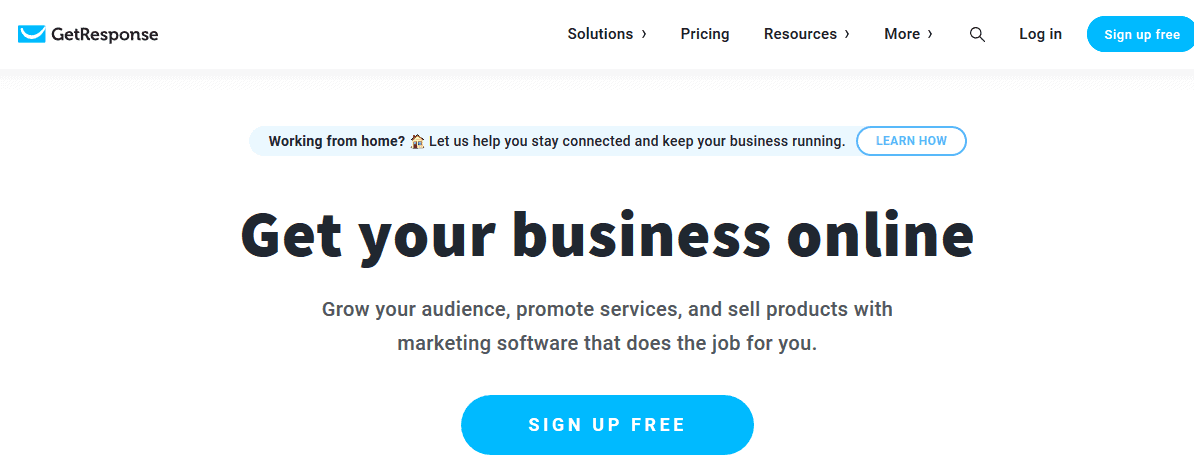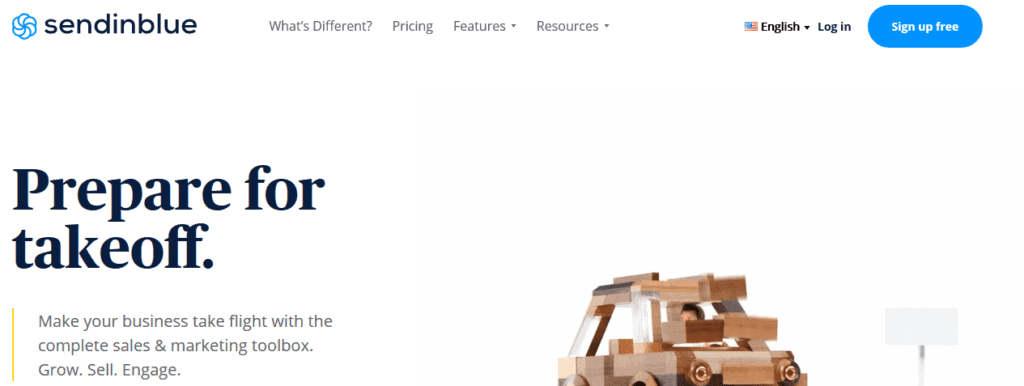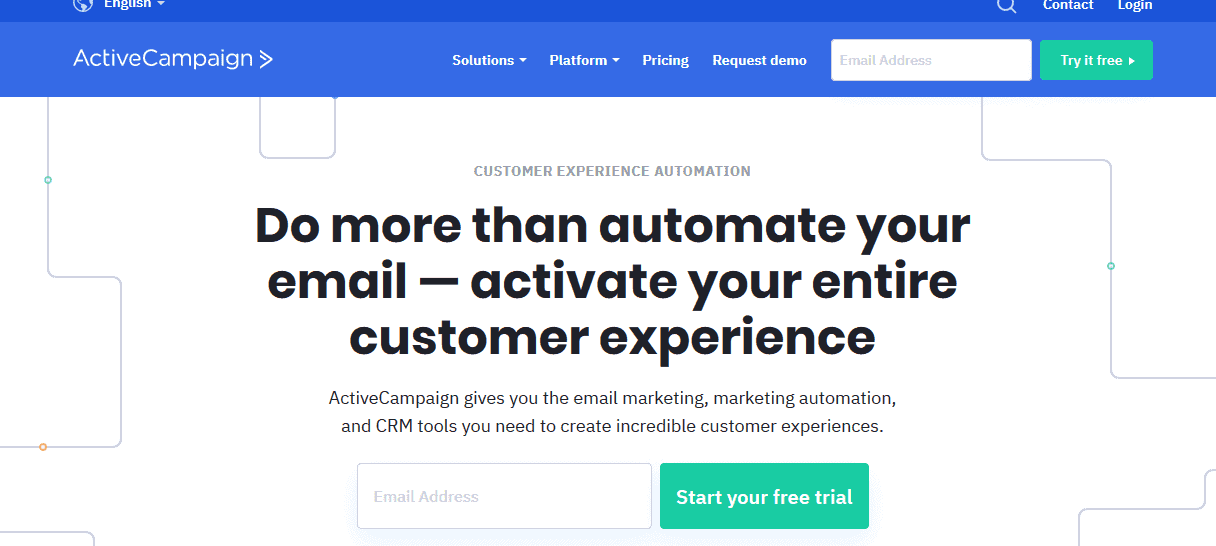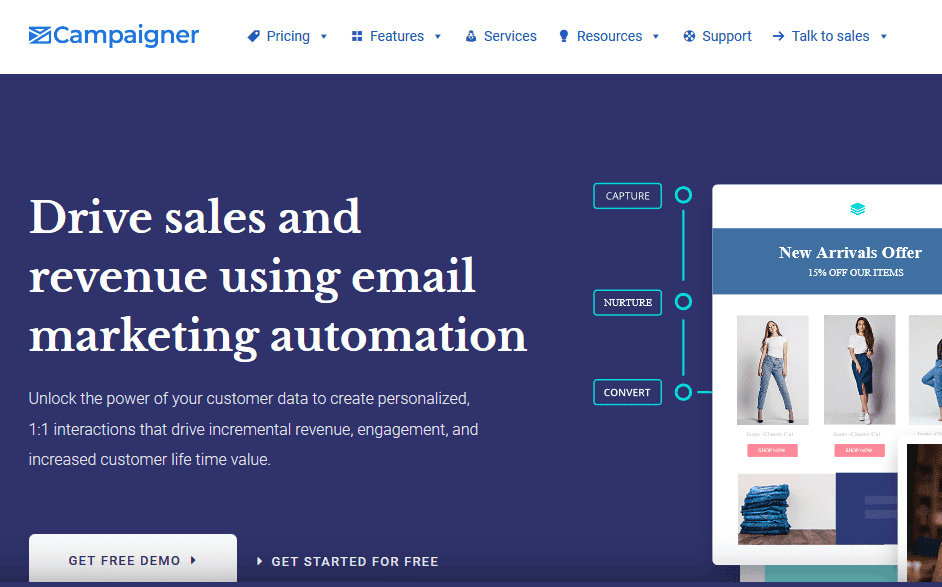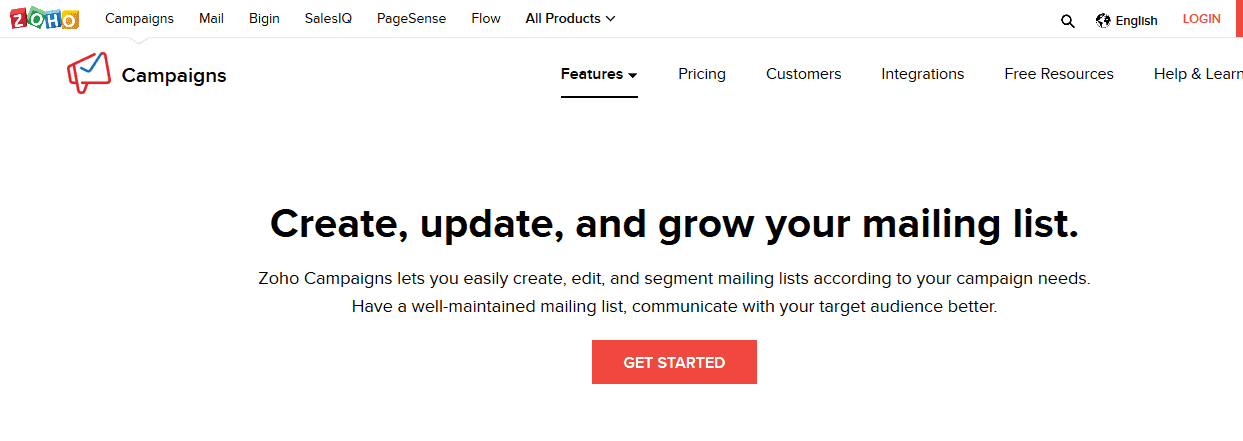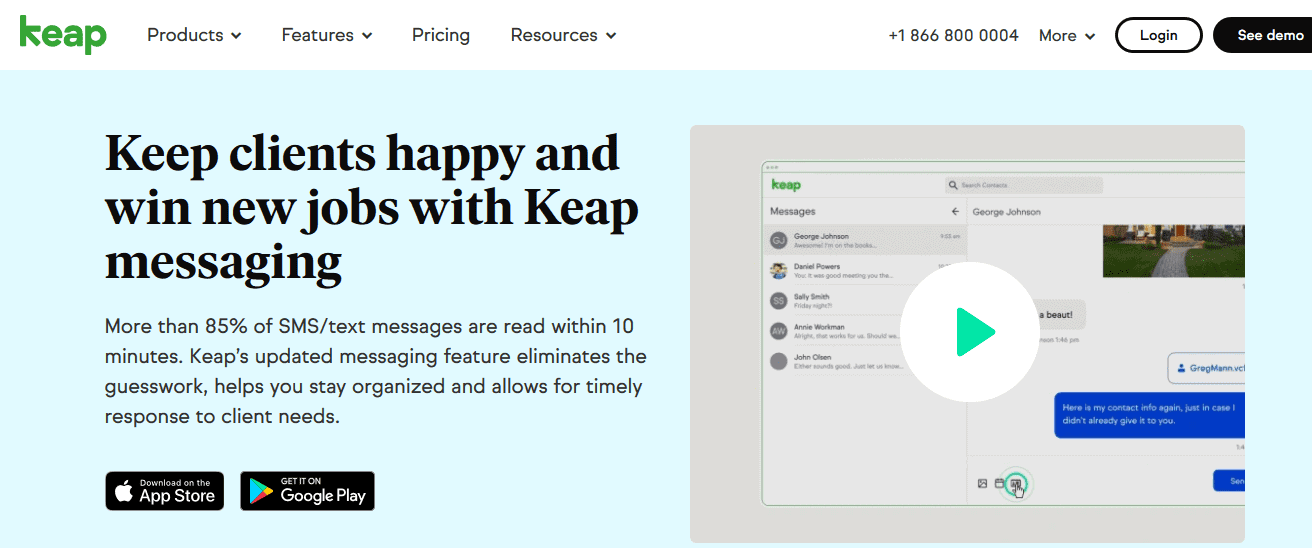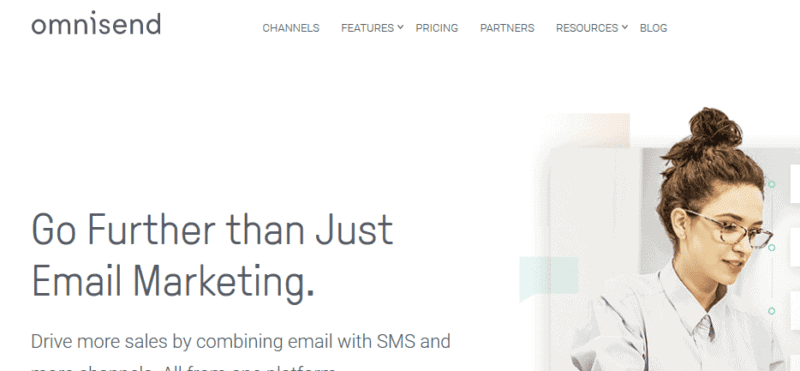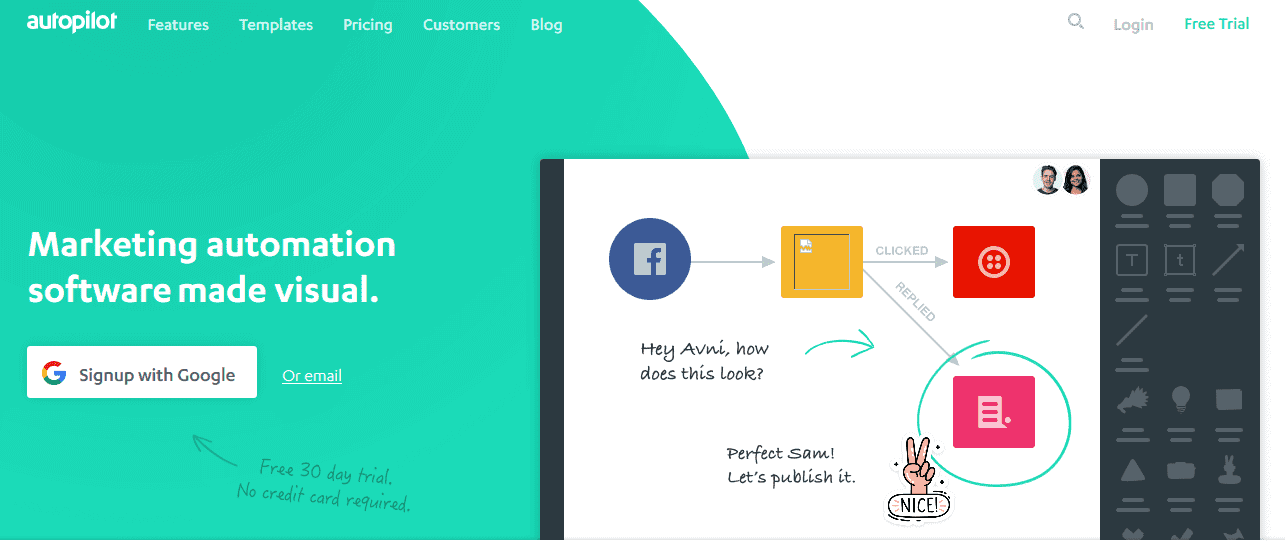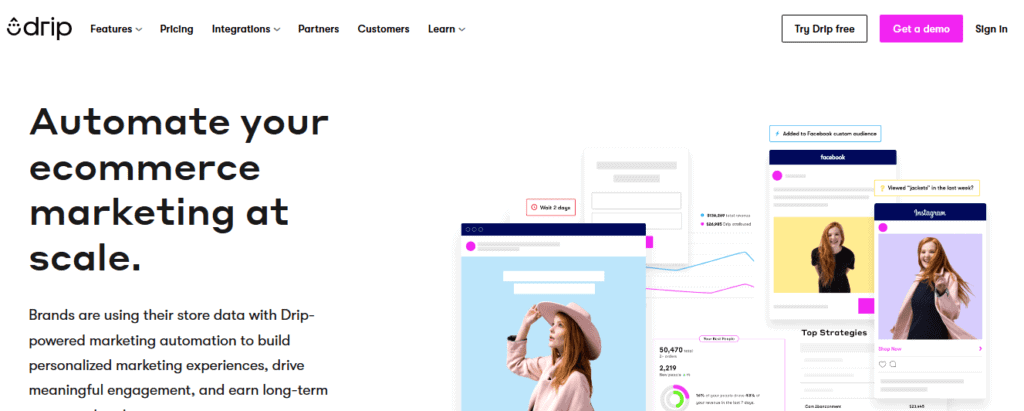You need the best marketing automation software to scale your business fast and convert more leads to customers.
Marketing automation software helps you automate most of your marketing process. You segment your audience by interest or stage in the buying process and target each segment with messages that drive the results you want for your business, and you measure the effectiveness of your marketing campaign.
These tools can also help you personalize the marketing message with each member’s unique attributes. They also cover advanced marketing processes, such as following up with your leads and customers.
Marketing automation tools cover a wide range of marketing functions, including designing and creating sales funnels, blogs, landing pages, and websites, as well as email marketing, SMS marketing, CRM, analytics, posting on Social Media, and other marketing activities.
You will find some good examples of marketing automation software on this page. With many options out there, it is very important that you get the right tool for your business.
I have curated a list of the best marketing automation software for your business. While some of these tools may overlap in function, others are designed to solve a specific problem.
You wouldn’t need all the tools listed here, but a couple of them could get the job done.
Best Marketing Automation Tools for 2026
In this post, I tested and reviewed the best marketing automation tools to simplify your marketing process.
However, when it comes to marketing automation, there are different tools for different marketing purposes. There are also all-in-one marketing tools that try to solve several problems.
Let’s get started with the list of the best marketing automation software for 2026.
1. Constant Contact
Email Automation is one of the foundational tasks in marketing automation, and if you are a beginner, it is a good place to start. Constant Contact is one of the oldest and best email marketing platforms, dating as far back as 1995.
However, these days it goes beyond email automation, offering a more comprehensive suite of features for automating your social media marketing, event management, and SMS marketing. This makes it one of the best marketing automation software for beginners.
Just like many of the other automation tools on this list, Constant Contact offers a simplified solution for email marketing automation.
It supports integration with over 300 services and tools, including Zapier, Eventbrite, Canva, and Google, enabling you to sync data across multiple platforms and simplify your workflow for a successful marketing campaign.
Constant Contact offers some unique email marketing features for eCommerce businesses. Offering a drag-and-drop builder interface, Constant Contact is easy to use and understand.
The ability to trigger emails based on where contacts click on your site is a great plus to Constant Contact.
Artificial intelligence is also integrated. AI can assist in writing your email copy, building your marketing campaign, and making content recommendations.
Needless to say, the segmentation feature that helps send hyper-targeted emails is priceless. The built-in CRM tool is also a great addition.
The contact management system allows you to upload your contact list from Excel or anywhere you have stored it into the Constant Contact database for easy management.
And that’s the strength of the tool: contact management. You don’t have to keep a scattered list of contacts everywhere on the internet. All you need to do is upload your contacts, and Constant Contact takes care of the rest.
Pricing
| Lite | $12/month |
| Standard | $35/month |
| Premium | $80/month |
2. Hubspot
HubSpot is one of the best marketing automation software platforms that helps attract, engage, and convert audiences into repeat customers. It is great for businesses of all sizes.
Not the regular tool, HubSpot is an all-in-one tool that offers a little bit of everything and is one of the best inbound marketing tools you can find in the market.
The automation tool is split into hubs, each targeted to different business requirements. There is a marketing hub, a service hub, a sales hub, an operations hub, a content hub, and more. Each hub offers a suite of tools to help you achieve a set of business objectives. A free CRM tool is also provided.
As you may have guessed, the marketing hub has all the essential tools you need to automate your marketing processes. The same goes for the service, sales, operations, and content hubs.
Talking of what you can achieve with the tool, the HubSpot marketing tool features an email automation tool.
With the email automation tool, you can schedule emails, track emails and notifications, leverage its built-in email templates for email marketing, and handle many other email automation needs.
The marketing hub contains an ad management system, forms, conversations inbox, team email, live chat, conversations email, list segmentation, reporting dashboard, retargeting, and many other marketing automation tools. It also boasts one of the best landing page builders.
A free plan that offers a couple of free tools and an affordable starter plan that offers marketing and business tools make Hubspot one of the best marketing automation software for small businesses.
Pros of HubSpot
- Offers a large suite of marketing tools
- HubSpot provides a free CRM tool
- Their marketing hub starter plan is affordable
- Provides in-depth insights
Cons of HubSpot
- Premium plans are expensive
- Lack of flexibility
Pricing
| Free | $0 |
| Starter | $9/month billed annually |
| Professional | $800/month billed annually |
| Enterprise | $3600/month billed annually |
3. Salesforce Marketing Cloud
Marketing Cloud (formerly called Pardot) is a marketing automation platform that is owned by Salesforce.
Founded in 2006, Salesforce Marketing Cloud has been in the business of helping businesses attract, engage, and convert their audience to customers.
The platform offers different lead management tools, such as streamlined lead management tools, smarter lead generation, effortless email marketing, seamless sales alignment, insightful ROI reporting, and artificial intelligence.
The streamlined lead management tool helps you send emails based on some triggers, including time and engagement style.
The tool helps you engage with dormant leads automatically. In essence, the tool will nurture and qualify your leads to help you make the best of your email list.
Pros
- Offers marketing automation for manufacturing companies and the health sector
- It’s best for businesses and enterprises
- Integration with Salesforce
Cons
- Their pricing plans are very expensive
- Not the best for freelancers and small business owners
Pricing
| Salesforce Starter | $25/month |
| Growth Edition | $1,500/month |
| Advanced Edition | $3,250/month |
4. GetResponse
GetResponse is a popular email marketing platform that has turned into an all-in-one marketing automation platform.
While GetResponse started as an email marketing automation software, it has added a number of marketing automation features, such as building websites and landing pages, creating sales funnels, webinar hosting, web push notifications, signup forms, and more features that make it a more versatile marketing solution.
You create templates for emails based on customer actions, like abandoning a shopping cart. You can also create the workflows for autoresponders.
The tool has a library of email templates to help you get started with engaging your subscribers.
GetResponse provides a good fit for most small to mid-sized businesses (SMBs) looking for both a reliable email marketing solution as well as a start into digital marketing in general.
It offers decent though stripped-down analytics and a large selection of third-party integration options. The platform provides a good starting point for SMB marketers looking to get their digital feet wet.
Where the platform beats the competition is that it doesn’t impose any email-sending limits, which is a common practice among email marketing services. You can send unlimited emails monthly.
GetResponse offers WordPress integration that allows the creation of a landing page in the GetResponse landing page editor, which enables you to select a page in WordPress, assign your directory name, and then publish the page.
Finally, by integrating your landing page with WordPress, you can build webinar and promotion pages as well as use pop-ups to generate more conversions.
In addition to WordPress, GetResponse also now integrates with e-commerce platforms; as a result, e-commerce data can be imported into GetResponse so users can do advanced segmentation.
The marketing automation software integrates AI to write content, create landing pages, and build marketing campaigns, push notifications, and courses.
Pricing
| Free | $0 |
| Starter | $19/month |
| Marketer | $59/month |
| Creator | $69/month |
5. Brevo
If you’re looking for a unique marketing automation software, then you should consider Brevo (previously SendInBlue).
While the majority of the marketing automation tools in the industry lay emphasis on email marketing and other forms of inbound marketing, Brevo still sees the power of SMS marketing and WhatsApp marketing.
SMS marketing (and WhatsApp marketing) is a way of connecting with your audience at the exact time and being sure that they get the message.
While your emails will be left in the inbox until your audience opens their email before they can see your message, with SMS and WhatsApp marketing, they get the notifications instantly, just the same way they receive calls.
Needless to say, combining SMS marketing and WhatsApp marketing with email marketing is what sets Brevo apart from its competitors.
However, despite integrating SMS and WhatsApp marketing, Brevo is a solid AI-powered email marketing automation platform. It allows you to automate your email marketing by segmenting your audience based on their engagement and interest.
Also, with Brevo, you can send transactional emails, which find their application in ecommerce businesses.
Transactional emails are the automatic emails that ecommerce brands send to their customers after purchase or in the process of purchasing a product from the store.
A typical example is a thank-you email to customers after paying for a product.
Aside from these, Brevo lets you create attractive landing pages, build signup forms, and run Facebook ads and retargeting campaigns.
While Brevo isn’t an all-in-one solution for marketing automation, it excels at email and SMS automation.
Pricing
| Starter | $9/month |
| Standard | $18/month |
| Professional | $499/month |
You get a 10% when you choose an annual plan.
6. ActiveCampaign
ActiveCampaign is by far one of the best email marketing automation platforms in the industry.
Aside from email automation, ActiveCampaign offers a marketing automation solution for small businesses and entrepreneurs.
To start with, ActiveCampaign allows you to set up a welcome email series for your subscribers. And what this does is to send new subscribers a welcome email on board.
You have the option of editing the content of the welcome email and also customizing it to fit your branding.
ActiveCampaign also provides a score point to identify possible leads from internet surfers.
The more engaged your contacts are with your emails, the more score points they acquire.
Contacts that reach a score of 100 can be separated using the segmentation and tagging feature of the tool.
You can easily tag with a class name to send hyper-targeted emails to your list.
The ability to integrate with other tools is priceless. ActiveCampaign gives you the flexibility of integrating with other tools.
You can integrate with your Shopify store and use the abandoned cart reminder to boost sales on your store.
Although ActiveCampaign offers an advanced reporting system to track your results, it isn’t easy to use.
It seems the most comprehensive part is the reporting system, but it isn’t easy to navigate around.
Here are some of the pros and cons:
Pros of ActiveCampaign
- Easy to use
- Offers flexible and cheap pricing plans
- Offers A/B split testing
- Supports integrations with popular tools like Zapier
Cons of ActiveCampaign
- Difficult to navigate the reporting system
- Their CRM is not as sophisticated as a standalone CRM tool
Pricing
| Starter | $15/month |
| Plus | $49/month |
| Pro | $79/month |
| Enterprise | $145/month |
7. Campaigner
Campaigner is a popular email marketing automation software offering automation workflows and engagement tools for small businesses.
Though it is not the sexiest platform, it is very easy to use, and the email templates follow suit.
Aside from that, segmenting contacts is easy. You can create custom fields, or you can use lists for the segment. You can use email actions to re-target contacts.
Campaigner rises above its competition by offering an excellent email marketing solution at a competitive price.
Where Campaigner beats the competition is its powerful third-party integrations and in-depth automation.
Their 24/7 live chat support and solid reporting are also a plus.
For all these capabilities, an intuitive interface, and a nice price, Campaigner can be considered for email marketing.
Campaigner is certainly more complex than other tools because the latter is aimed at an audience seeking only basic functionality, even though it recently announced that it is expanding its capabilities to a full-service marketing automation platform.
Campaigner allows you to send an unlimited number of email messages per month to your list.
With their automation tool, Campaigner allows you to create the workflow for auto-responder emails.
These auto-responders can be sent when certain triggers (or actions) occur, like a form submission or profile change.
Notably, they can be employed to reach out to highly engaged customers or those customers who have recently made or are ready to make a purchase (see the “Basic Marketing Automation” section below for more on this topic).
Marketers, however, can best use auto-responders to create welcome emails. When you sign up for a newsletter, that would trigger a welcome email to be sent to you, perhaps with a 10 percent discount.
Remarkably, the Campaigner enables users to embed real-time display ads in newsletters, target their subscribers based on their area, or find out where their subscribers live based on geolocation.
Pricing
| Essentials | $14/month |
| Advanced | $35/month |
8. Zoho Marketing Automation
Zoho is an all-in-one solution that offers marketing tools, sales tools, finance and accounting tools, project management tools, and many other tools you need to run a successful business.
However, all their products work individually with individual pricing plans. When it comes to marketing automation, Zoho Marketing Automation is Zoho’s solution for marketing automation.
It is a complete marketing automation software that helps you automate your marketing process, whether email, SMS, social media, WhatsApp, and more. Zoho Marketing Automation allows you to build attractive email forms, manage your subscribers, and run marketing campaigns. You can also create landing pages.
Zoho Marketing Automation offers three different pricing plans: Standard, Professional, and Enterprise.
Pricing
| Standard | $19/month |
| Professional | $29/month |
| Enterprise | $59/month |
A discount is available when you pay for an annual plan.
9. Adobe Marketo Engage
Marketo is an AI-powered marketing automation software that was founded in 2006.
A child company of Adobe, Marketo offers marketing automation for account-based marketing and other marketing services like SEO and content creation.
However, where they shine is in their account-based solutions for small businesses.
The marketing automation tool helps you coordinate your sales and marketing.
With the account-based marketing tool, you can profile leads, segment them, and also engage with them through predictive content.
Aside from account-based marketing, Marketo provides lead management, email marketing, consumer marketing, customer-base marketing, mobile marketing, and revenue attribution solutions.
Pros of Marketo
- Marketo is an all-in-one marketing solution offering a wide range of solutions
- Offers a flexible marketing automation tool
- Easy to use
Cons of Marketo
- Poor customer service
- Complicated pricing plans
- Lacks a CRM tool
- Expensive pricing plans
- Marketo lacks a comprehensive analytics report system
10. Keap
Keap is a marketing automation software and customer relationship management (CRM) system for small businesses. Founded in 2001 as InfusionSoft, it has since changed its name to Keap.
Keap isn’t your regular email marketing tool. Keap offers an advanced CRM tool that sets it apart from the rest.
Just like many other email marketing automation tools, Keap allows you to send an automatic email sequence to your email subscribers.
A typical example sequence is a welcome email to new subscribers, followed by a thank-you email accompanied by an eBook.
Aside from the usual marketing automation software features that we are used to, Keap goes as far as adding more features to its platform.
With Keap, you can automatically generate invoices and receive payment from clients.
You can also send quotes to your customers, while Keap provides an analytics dashboard to track your activities.
Needless to say, the ability to generate invoices, send quotes, and receive payments makes Keap perfect for service-based businesses like agencies.
And here’s the best part: Keap offers a messaging feature that helps you communicate with your clients and also win more clients.
The messaging feature is not left out of the automation world. You can easily automate some part of the messaging feature by sending an automated reply to your clients while you’re away.
Their pricing plan starts from $299 per month.
Pros of Keap
- Offers a client management system to keep Clients’ info
- Has a user-friendly and intuitive user interface
- Offers advanced integration
- Sales cycle management
Cons of Keap
- The pricing seems expensive
- Overwhelming excessive features
11. Kit
Kit is one of the best email marketing automation software in the industry.
The tool brands itself as an email marketing tool for online creators. Needless to say, it isn’t your regular email marketing automation tool.
During the early phase of Kit (previously called ConvertKit), it was marketed as an email marketing solution for bloggers.
And to be candid, the majority of their customers are bloggers and online course creators.
Absolutely, Kit offers top-notch service for online creators.
To start, Kit has a simple approach to creating sign-up forms and also embedding them into your website.
Building a landing page is easy with Kit. And that’s because Kit offers landing page templates to help you get started easily.
Plus, Kit allows you to organize your email list using tags and segments to break them down based on their interest and engagement rates.
Just like you guessed, having a professional email plays a lot into your brand’s image. And with ConvertKit email designer, you can easily get a professional-looking email to launch your email campaign with.
And here’s where Kit excels, in integration. Kit offers integration with a large pool of software and tools you need to run your business.
And that brings us to the fact that Kit is definitely not an all-in-one solution, and they don’t try to paint themselves that way.
Instead, Kit provides a pool of integrations for you to integrate their tool.
Among many others, Kit integrates with landing page and eCommerce tools, as well as many others.
Pros of Kit
- Kit is pretty easy to use
- They provide excellent support
- Tag-based subscriber system to slice and dice your list based on their interest
- Provides landing page templates to get you started
Cons of Kit
- Limited A/B split testing
- Incomprehensive report system
- Offers limited customization for forms and email templates
Pricing
| Newsletter | $0/month |
| Creator | $33/month |
| Pro | $66/month |
12. OmniSend
Unlike most of the other marketing automation tools on this list, OmniSend is a different and unique tool with a different selling proposition.
OmniSend is an eCommerce marketing automation tool. Founded in 2014, OmniSend started as an email marketing platform called Soundest.
Instead of targeting the general business world with the email marketing automation tool, OmniSend has decided to double down on eCommerce companies and brands.
And needless to say, they’re doing a good job in the eCommerce industry.
Offering unique email marketing features for eCommerce brands in order to improve conversion rate and sales.
Their form builders are unique and targeted toward eCommerce, using common language like discounts and Black Friday to draw customers into their email list.
However, OmniSend does seem to include transactional emails for eCommerce companies and brands to alert their customers on the different purchasing stages.
That said, OmniSend has its strength in its workflow automation. The marketing automation platform combines email marketing, SMS, Messenger, and push notifications to provide an omnichannel experience for eCommerce brands.
Lastly, their analytics dashboard provides actionable insights for improving and increasing sales.
Pros of OmniSend
- Customizable email templates
- Best for eCommerce companies and brands
- Easy integration with eCommerce store builders like Shopify
- High email conversion rate
- Offers a forever-free plan
Cons of OmniSend
- Lacks transactional emails
Pricing
| Standard | $11.20/month |
| Pro | $41.30/month |
13. MailChimp
MailChimp is an American marketing automation software that provides email marketing services for small businesses.
Founded in 2001, MailChimp has grown to become an all-in-one marketing solution for businesses.
While the majority of the marketing automation tools are alike in the services they offer, a few of them have unique offerings.
Just as you figured, MailChimp has some unique offerings that can be a great plus for small businesses and solopreneurs.
To start with, MailChimp offers a free custom domain for businesses to start out with their own website.
Offering all the basic email automation tools like tagging, segmentation, CRM, signup forms, and many more, the tool also offers advanced features like behavioral targeting and transactional emails.
The transactional email feature qualifies MailChimp as a marketing automation tool suited for eCommerce stores.
With transactional email, you can engage with your customers while they’re in the purchasing stage.
And the Forever Free plan is also a great plus to the tool.
Pros of MailChimp
- Offers an easy-to-use and understandable interface
- Provides transactional emails for eCommerce
- Offers a forever-free plan
- customizable email templates
Cons of MailChimp
- Having a membership-based site can be difficult
- Very basic, ready-made templates
- Your account can be suspended or canceled if any traces of spam are noticed
Pricing
| Free | $0 |
| Essential | $13/month |
| Standard | $20/month |
| Premium | $350/month |
Claim a 50% discount if you pay for a full year.
14. Ortto
Ortto is one of the most visual marketing automation platforms in the industry.
To begin with, the automation workflow in Ortto (previously called AutoPilot) is a drag-and-drop visual editor that lets you build an email sequence.
Ortto can be very simple and also overwhelming for beginners, but it is easier to grab and understand owing to the attractive visual interface.
Basically, you can draw out the path for your customer’s journey and keep everything running smoothly with or without you.
And that’s the joy of a marketing automation tool.
All the emails can be arranged in a sequence with a trigger set alongside to trigger the emails to work.
And in order to simplify the setup process, Ortto provides built-in email templates.
Absolutely, the tool is suitable for both online and offline businesses. The entry-level Starter plan can handle 5000 contacts at the base price.
Pricing
| Starter | $199/month |
| Professional | $599/month |
| Business | $999/month |
Claim 10% off when you pay for a full Quarter and 15% off for a full year.
15. Drip
Aside from OmniSend, Drip is the second email marketing automation tool that focuses on eCommerce businesses as its target.
Looking at the automation needs for eCommerce, good automation software must not only focus on attracting new subscribers but must also help improve sales generally.
And that’s the exact direction Drip comes from.
Drip offers a segmentation feature that helps in dividing email lists into different categories based on their interest and engagement rates.
And this, in turn, has a better result on email marketing campaigns. By splitting your contacts, you can target them based on their interest and level in the purchasing cycle.
Absolutely, their abandoned cart reminder is a deal-maker for the business.
Plus, Drip integrates with popular e-commerce platforms, making it easy to link the tool to many of the eCommerce platforms.
However, unlike most of the tools on this list, Drip does not offer a fixed pricing plan.
Their pricing plan is very flexible and only depends on the size of your email list.
The price starts at $39 per month for not more than 2,500 contacts with unlimited email sends.
Conclusion
There you have it: The best marketing automation tools to take your business to the next level.
Absolutely, you wouldn’t need all the tools mentioned here because many of them have overlapping functions.
But a couple of them will make your marketing fantastic.
So there you go.
What marketing automation tool have you used before?
I would love to hear from you.





